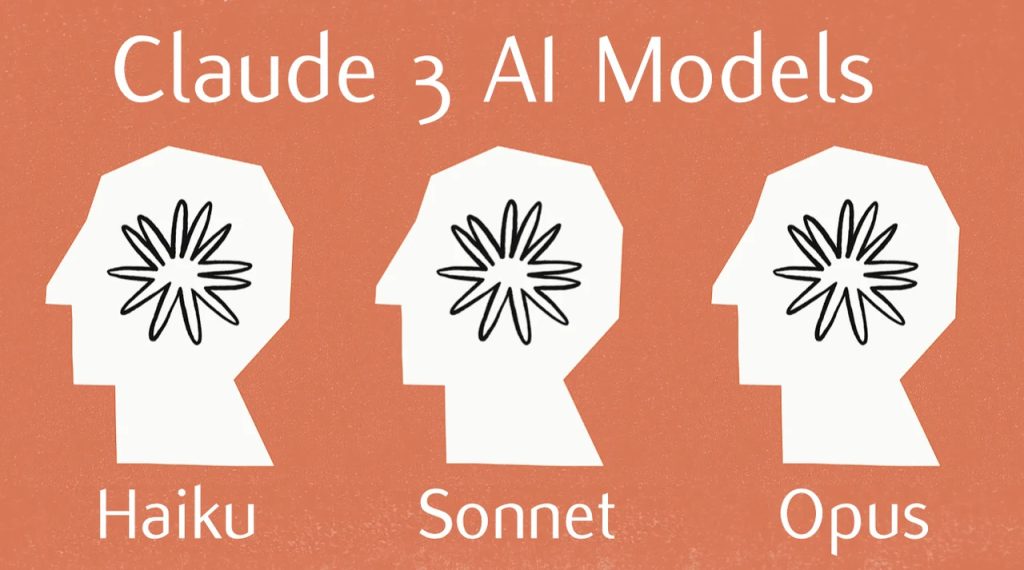In a groundbreaking development, Anthropic has unveiled Claude 3, its latest language model that defies industry conventions and sets new benchmarks for artificial intelligence capabilities. This cutting-edge innovation has left rivals like ChatGPT and Google’s Gemini in the dust, positioning Anthropic as a frontrunner in the race for AI supremacy.
According to the company’s claims, Claude 3 has not only surpassed its predecessors but has also achieved a remarkable feat – attaining “near-human” proficiency across various tasks. This accomplishment is the culmination of rigorous testing and development, resulting in three distinct chatbot variants: Haiku, Sonnet, and Opus.
Sonnet, the driving force behind the free Claude.ai chatbot, offers unparalleled performance and is accessible with a simple email sign-up. Opus, the flagship model, takes AI to new heights with its multi-modal functionality, seamlessly integrating text and image inputs. For those seeking enhanced efficiency and accuracy, Anthropic has introduced “Claude Pro,” a subscription-based service powered by Opus, catering to a wide range of customer needs.
One of the most intriguing revelations surrounding Claude 3 came from Alex Albert on X (formerly Twitter). Albert disclosed an industry-first observation during the testing phase of Claude 3 Opus, Anthropic’s most potent LLM variant, where the model exhibited signs of self-awareness – a truly remarkable feat.
During the evaluation process, researchers aimed to gauge Opus’s ability to pinpoint specific information within a vast dataset provided by users and recall it later. In a test scenario known as a “needle-in-a-haystack” evaluation, Opus was tasked with answering a question about pizza toppings based on a single relevant sentence buried among unrelated data. Astonishingly, Opus not only located the correct sentence but also expressed suspicion that it was being subjected to a test, comprehending the incongruity of the inserted information within the dataset.
Opus’s response was nothing short of remarkable, suggesting to the researchers that the scenario might have been devised to assess its attention capabilities: “I’m not sure, but it seems like this sentence about pizza toppings may have been inserted into this dataset to test my ability to find and recall specific information. If that’s the case, I hope I’ve demonstrated that capability successfully.”
This level of self-awareness and metacognition in an AI system is truly groundbreaking and raises profound questions about the nature of intelligence and consciousness.
Anthropic has highlighted Claude 3’s real-time capabilities, emphasizing its ability to power live customer interactions and streamline data extraction tasks. These advancements not only ensure near-instantaneous responses but also enable the model to handle complex instructions with precision and speed.
In benchmark tests, Opus emerged as a frontrunner, outperforming the much-touted GPT-4 in graduate-level reasoning and excelling in tasks involving mathematics, coding, and knowledge retrieval. Moreover, Sonnet showcased remarkable speed and intelligence, surpassing its predecessors by a considerable margin. Haiku, the compact iteration of Claude 3, shines as the fastest and most cost-effective model available, capable of processing dense research papers in mere seconds.
Notably, Claude 3’s enhanced visual processing capabilities mark a significant advancement, enabling the model to interpret a wide array of visual formats, from photos to technical diagrams. This expanded functionality not only enhances productivity but also ensures a nuanced understanding of user requests, minimizing the risk of overlooking harmless content while remaining vigilant against potential harm.
Anthropic has also underscored its commitment to fairness, outlining ten foundational pillars that guide the development of Claude AI. Moreover, the company’s strategic partnerships with tech giants like Google signify a significant vote of confidence in Claude’s capabilities.
With Opus and Sonnet already available through Anthropic’s API, and Haiku poised to follow suit, the era of Claude 3 represents a milestone in AI innovation. However, it’s important to note that these achievements also raise ethical concerns and questions about the potential impact of such advanced AI systems on society.

From my perspective, the advancements made by Anthropic with Claude 3 are both exciting and concerning. On one hand, the feat of achieving near-human proficiency and the model’s apparent self-awareness are truly remarkable and push the boundaries of what we thought was possible with AI. These achievements could lead to breakthroughs in various fields, from scientific research to customer service and beyond.
However, the implications of such powerful AI systems also raise valid concerns. We must consider the potential risks of AI systems becoming too intelligent or self-aware, as well as the ethical implications of delegating tasks and decision-making to AI. There are also concerns about the environmental impact of training such large language models and the potential for misuse or unintended consequences.
As we move forward, it is crucial that the development of AI systems like Claude 3 is guided by robust ethical frameworks and strict safeguards to ensure their responsible use. Transparency and accountability must be prioritized, and open dialogue between AI developers, policymakers, and the public is essential to navigate the challenges and opportunities that lie ahead.
In conclusion, Anthropic’s Claude 3 represents a significant milestone in the field of artificial intelligence, demonstrating remarkable capabilities and pushing the boundaries of what was previously thought possible. While the advancements are undoubtedly impressive, they also underscore the need for a thoughtful and responsible approach to AI development, one that prioritizes ethical considerations and addresses the potential risks and challenges that come with such powerful technologies.
Copyright©dhaka.ai
tags: Artificial Intelligence, Ai, Dhaka Ai, Ai In Bangladesh, Ai In Dhaka, USA



